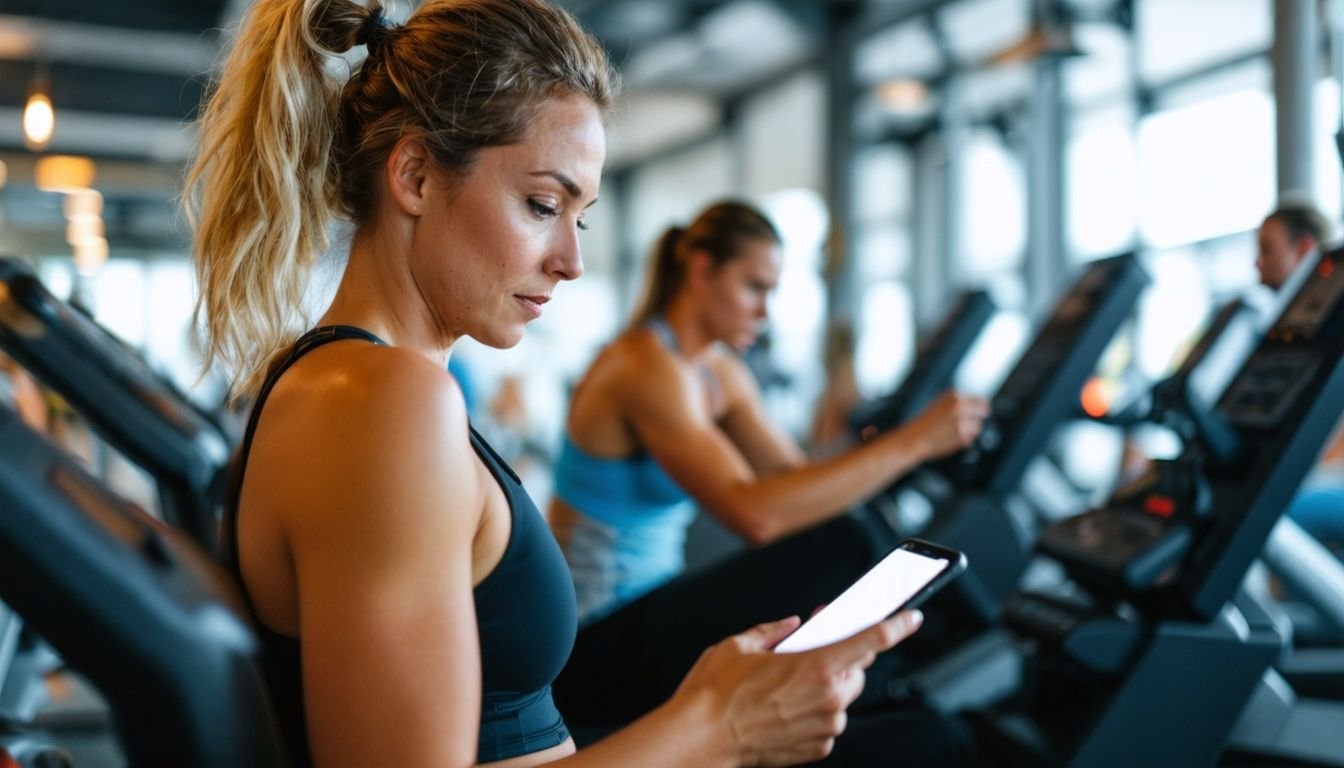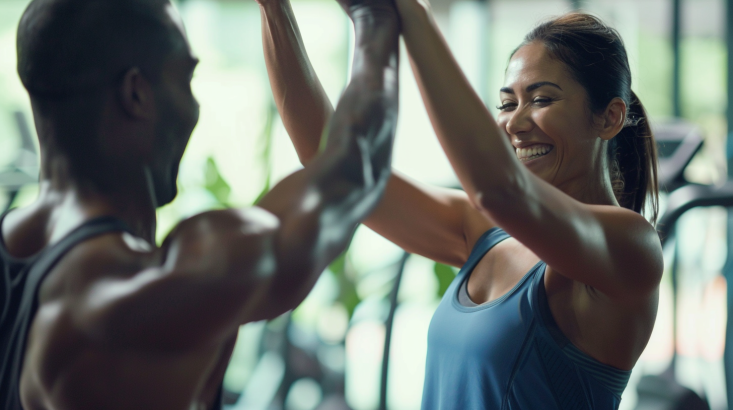In today’s fitness culture, the obsession with the scale has taken a toll on our body image. Constantly weighing ourselves can be misleading and have negative effects on our mental and physical health.
The pressure set by social media influencers and the dangers of extreme dieting and exercise only add to the problem. It’s time to shift our focus from the scale to overall health, embracing body diversity, and rejecting unrealistic standards.
Explore how to overcome body image issues in the fitness world and develop a healthy relationship with food and exercise.
The Impact of Modern Fitness on Body Image
The impact of modern fitness on body image extends beyond physical appearance, delving into the realms of self-acceptance, mental health, and societal standards. In an era dominated by the fitness industry, fostering a healthy mindset, self-care practices, and embracing body diversity are essential components of a wellness journey towards achieving fitness goals while promoting self-love and positive body image.
This shift towards body positivity emphasizes that beauty comes in all shapes and sizes. Society’s growing awareness of the importance of self-acceptance encourages individuals to embrace their unique features, celebrate diversity, and prioritize mental well-being over unrealistic beauty standards.
By promoting healthy self-esteem and encouraging individuals to view fitness as a means to enhance overall wellness rather than solely focusing on physical aesthetics, a more inclusive and empowering narrative around body image is being woven into the fabric of modern society.
The Obsession with the Scale
The obsession with the scale often leads to negative self-perceptions, body dissatisfaction, and harmful comparisons based on appearance standards. This fixation can perpetuate weight stigma, body shaming, and misconceptions about fitness that hinder body appreciation and self-worth.
Many individuals tie their self-worth to the number displayed on the scale, believing it defines their value. This mindset contributes to a cycle of negative self-talk and can lead to disordered eating behaviors.
Weight stigma perpetuates unrealistic beauty ideals and perpetuates the belief that one’s worth is solely based on physical appearance. Body shaming, often perpetuated by societal norms and media influences, further exacerbates insecurities and creates a toxic environment for those seeking acceptance and validation beyond their physical attributes.
How the Scale Can Be Misleading

Understanding how the scale can be misleading is crucial in aligning fitness goals with body confidence beyond physical appearance. Embracing body empowerment, redefining physique ideals, and practicing self-compassion can shift the focus from external measures to internal health and sustainable exercise habits for holistic body transformation.
Focusing solely on the number on the scale can create a narrow view of progress, often leading to feelings of discouragement and inadequacy. It’s important to remember that fitness is not just about weight, but also about strength, endurance, flexibility, and overall well-being.
By cultivating a sense of self-compassion and understanding that progress looks different for everyone, individuals can embrace their unique journey towards fitness. This mindset shift can foster a healthier relationship with exercise and body image, promoting long-term sustainability and confidence in one’s physical abilities.
The Negative Effects of Constantly Weighing Ourselves
The negative effects of constantly weighing ourselves extend beyond physical outcomes, impacting mental health, perpetuating diet culture, and disrupting our exercise routines. This habit often leads to detrimental body comparisons, affecting emotional well-being and contributing to the toxic norms prevalent in fitness culture.
Individuals caught in the cycle of relentless scale-checking often experience heightened anxiety and stress levels, as their self-worth becomes intertwined with the numbers displayed. The pressure to meet unrealistic societal standards can also result in unhealthy behaviors, such as extreme dieting or excessive exercise, which further strain mental wellness. It is crucial to shift the focus from external validation to internal self-acceptance, recognizing the value of muscle mass, overall health, and personal growth over conforming to external ideals.
The Problem with ‘Fitspo’ Culture
The problem with ‘Fitspo’ culture lies in its pervasive social media influence, often promoting unrealistic body transformations that overlook the importance of emotional resilience, self-empowerment, and the dangers of exercise addiction. Fitness influencers play a significant role in shaping perceptions of body neutrality and raising awareness of body dysmorphic disorders.
These influencers serve as powerful voices advocating for a shift towards body acceptance and self-love, emphasizing the uniqueness and beauty of individual bodies. By showcasing diverse body types and sharing personal stories of overcoming body image struggles, they help destigmatize discussing mental health in relation to physical appearance. The transparency around their own challenges and insecurities fosters a sense of connection with their followers, encouraging authenticity and acceptance rather than comparison and self-criticism.
The Unattainable Standards Set by Social Media Influencers
Social media influencers often perpetuate unattainable standards through curated content that may contradict the principles of body positivity, fuel exercise trends that promote unrealistic body comparisons, and hinder genuine self-improvement. Recognizing these challenges is essential in advocating for the body acceptance movement and fostering self-esteem through self-empowerment.
By showcasing seemingly flawless bodies and lifestyles, influencers create an illusion that can lead to self-doubt and dissatisfaction among their followers. This phenomenon contributes to the pervasive culture of comparison and the pressure to conform to narrow beauty standards. Individuals can combat these influences by cultivating self-awareness, practicing self-compassion, and engaging in activities that promote holistic well-being rather than solely focusing on physical appearance.
The Pressure to Have a Certain Body Type
The pressure to adhere to a specific body type perpetuated by societal norms and diet culture can lead to harmful practices of extreme weight loss, impacting self-worth and body diversity. Embracing self-validation and addressing body dysphoria are crucial steps towards promoting size acceptance and fostering a more inclusive fitness culture.
By acknowledging that bodies come in various shapes and sizes, individuals can break free from the constraints of unrealistic beauty standards. Recognizing the value of health over appearance encourages a shift towards holistic well-being instead of focusing solely on outward aesthetics. It is essential to challenge the narrative that equates thinness with worthiness and prioritize mental and physical wellness above conformity. Promoting diversity and celebrating the uniqueness of each individual fosters a more positive and inclusive environment where everyone feels accepted and empowered in their own skin.
The Dangers of Extreme Dieting and Exercise
The dangers of extreme dieting and overexercising go beyond physical health risks, encompassing a significant mental toll that can perpetuate fitness myths, impact emotional well-being, and neglect holistic health practices. Addressing these dangers requires a shift towards mindfulness, body positivity, and a holistic approach to well-being.
When individuals engage in extreme dieting and overexercising, they not only put a strain on their bodies but also risk falling into a cycle of disordered eating habits and negative self-image. The pressure to achieve unrealistic body standards promoted by society and social media can further exacerbate mental health issues like anxiety and depression. These behaviors often lead to nutrient deficiencies, hormonal imbalances, and even serious medical conditions, emphasizing the importance of prioritizing balanced nutrition and sustainable fitness routines over quick fixes or fad diets.
The Risks of Cutting Out Entire Food Groups
Understanding the risks of cutting out entire food groups is essential in navigating diet culture pitfalls, fostering a wellness journey rooted in self-care, and prioritizing body satisfaction.
By delving into the implications of eliminating specific food groups, individuals can shift their focus away from restrictive eating patterns towards a more balanced approach to nutrition.
Strategies for self-care, such as mindful eating and stress management techniques, play a crucial role in enhancing body satisfaction and promoting overall well-being.
Embracing physical activities that bring joy and fulfillment, along with nourishing the body with nutrient-dense foods, can aid in cultivating sustainable exercise habits and boosting internal health.
The Physical and Mental Toll of Overexercising

The physical and mental toll of overexercising can undermine both body confidence and mental health, hindering self-acceptance and potentially leading to exercise addiction.
Finding a balance between pushing oneself to achieve fitness goals and recognizing when rest and recovery are necessary is crucial. Incorporating variety into one’s exercise routine, such as trying different activities or focusing on cross-training, can prevent burnout and reduce the risk of overexercising. Setting realistic and sustainable fitness goals, rather than constantly striving for perfection, can help cultivate a healthier mindset towards physical activity. Building mental resilience through practices like mindfulness, meditation, and positive self-talk can also equip individuals to cope with stress and setbacks in a more constructive manner.
Why We Need to Shift Our Focus from the Scale to Overall Health
Shifting our focus from the scale to overall health is essential in promoting body acceptance, fostering self-empowerment, and cultivating sustainable exercise habits that align with a healthy lifestyle. Embracing holistic health practices, prioritizing body satisfaction, and incorporating body positivity tips can lead to a more fulfilling and balanced approach to well-being.
By redirecting our emphasis towards holistic health, individuals can empower themselves to view exercise as a means of self-care and wellness rather than just a tool for weight management. This shift enables a deeper connection with the body, focusing on how it feels and performs rather than predominantly on its appearance.
Encouraging a culture of self-acceptance and embracing diverse body types fosters a positive mindset, encouraging individuals to appreciate their unique strengths and capabilities. Implementing positive affirmations and surrounding oneself with supportive communities can further enhance overall well-being and body positivity.
The Importance of Listening to Our Bodies
The importance of listening to our bodies cannot be overstated in the context of self-care, fostering a wellness journey grounded in self-acceptance, and cultivating self-love. Attuning to our physical and emotional needs enhances emotional well-being, nurtures self-compassion, and refines our exercise perception for a more mindful approach to fitness.
By tuning into how our bodies feel during movement and rest, we develop a deeper understanding of what serves us best. This practice goes beyond physical sensations; it also involves acknowledging our mental and emotional states. Through this mindful awareness, we can make choices that honor our overall well-being, fostering a harmonious relationship with ourselves.
Embracing a holistic approach to self-care allows us to redefine our perception of exercise from a purely physical activity to a form of self-expression and self-nurturing. This shift in perspective encourages us to move with intention and kindness towards ourselves.
How to Develop a Healthy Relationship with Food and Exercise
Developing a healthy relationship with food and exercise is pivotal in combating diet culture, enhancing self-worth, and fostering body confidence within the body acceptance movement. Overcoming body shaming, promoting body inclusivity, and embracing diverse perspectives are key in establishing a positive and sustainable approach to well-being.
By prioritizing self-care and listening to your body’s needs, you can shift the focus from external validation to internal fulfillment. It’s about nourishing your body with nutrient-rich foods and engaging in physical activities that bring you joy rather than punishment.
Incorporating mindfulness practices into your daily routine can help you build a deeper connection with your body and appreciate its strength and resilience. Remember, every body is unique and deserving of love and respect regardless of societal standards.
Embrace your individuality and celebrate the diverse beauty that exists in all shapes and sizes.
How to Overcome Body Image Issues in the Fitness World
Overcoming body image issues in the fitness world requires a multifaceted approach encompassing body positivity, self-improvement, and resilience against harmful body comparisons. Nurturing emotional resilience, embarking on a body confidence journey, and enhancing mental strength are crucial steps towards self-validation and empowerment in navigating the complexities of the fitness culture.
By focusing on fostering emotional resilience, individuals can develop the capacity to bounce back from setbacks and criticism, fostering a sense of inner strength and self-worth. Undertaking a body confidence journey involves accepting and appreciating one’s unique physical attributes, rather than constantly comparing oneself to unattainable standards.
Building mental resilience is about cultivating a positive mindset, challenging negative self-talk, and practicing self-compassion to combat the damaging effects of societal pressure. By promoting self-validation, individuals can gain a deeper sense of empowerment and confidence in their bodies, shifting the focus from external validation to internal acceptance.
Embracing Body Diversity and Rejecting Unrealistic Standards
Embracing body diversity and rejecting unrealistic standards are pivotal in nurturing self-esteem, establishing sustainable exercise habits, and fostering self-empowerment. Cultivating a positive self-image, enhancing self-acceptance, and celebrating individual uniqueness contribute to a more inclusive and supportive fitness environment.
It is important to acknowledge that self-esteem plays a crucial role in how one perceives themselves, affecting their motivation to engage in physical activities and maintain a healthy lifestyle.
By embracing body diversity, individuals are encouraged to appreciate their bodies for their functionality and strength, rather than solely focusing on appearance.
This shift in mindset promotes a more balanced approach to exercise and wellness, allowing individuals to prioritize their health and well-being over conforming to societal beauty standards.
Focusing on Strength and Functionality Rather Than Appearance
Shifting the focus towards strength and functionality over mere appearance can enhance athletic performance, promote body awareness, and emphasize holistic health within a wellness journey. By recalibrating fitness expectations to prioritize strength and functionality, individuals can cultivate a more sustainable and fulfilling approach to physical well-being.
This shift in perspective encourages individuals to view fitness as a means of strengthening the body’s functional capabilities rather than solely focusing on aesthetics. Embracing strength and functionality empowers individuals to move beyond superficial goals and delve into the realms of enhanced athletic performance and body awareness. This holistic approach to health and fitness instills a deep sense of interconnectedness between strength, mobility, and overall wellness, fostering a more profound respect for the body’s abilities and functions.





